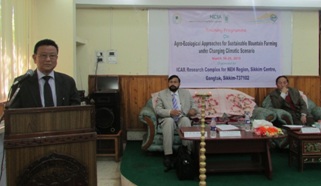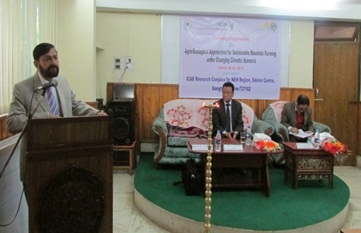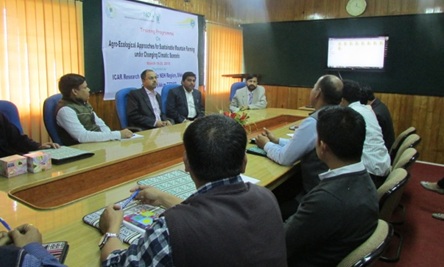ICAR Sikkim Centre organizes Training programme on Sustainable Mountain Farming under Changing Climatic Scenario
ICAR Research Complex for NEH Region, Sikkim Centre, Tadong, Gangtok -737 102 initiated 10-day (March 16-25, 2015) training programme on Agro-Ecological Approaches for Sustainable Mountain Farming under Changing Climatic Scenario under the aegis of National Initiative on Climate Resilient Agriculture (NICRA) project. This programme is being organized with the aim to acquaint teachers / researchers /extension personnel about adaptation and mitigation strategies for managing emerging environmental problems for enhancing sustainability of mountain agriculture. Various issues such as resource conservation techniques, technologies for efficient water/ nutrient utilization for enhancing production of crop, soil health, breeding strategies and animal health will be discussed.
Shri P.T. Bhutia, Director, Horticulture and Cash Crop Development Department, Govt. of Sikkim was the Chief Guest of the program. He emphasized upon the importance of changing climatic scenario and their consequences on mountain farming. He also called upon the scientists, to develop the climate management strategies for hilly ecosystems.
As Guest of Honour, Shri C. K. Dorjee, Director, Press Information Bureau, Govt. of India, Gangtok shared his experiences of climate change and their impact on day to day activities on humans. He also quoted from the concerns raised by Honorable Prime Minister Shri Narendra Modi during recent visits to Seychelles and Mauritius.
Dr R. K. Avasthe, Joint Director, ICAR, Sikkim Centre and Course Director of this training programme in his introductory remarks highlighted the importance of this training programme in the era of climate change. He emphasized that the consequences of biodiversity loss from climate change are likely to be the greatest for poor and marginalized people, who depend almost exclusively on natural resources. High-altitude rangelands could be the most sensitive agro-ecosystem in terms of the effects of erratic shifts in rainfall patterns, greater variability, and frequent extreme events of both precipitation and temperature. Such productivity loss would translate into a greater risk of food insecurity. He also emphasized that changes in climate will interact with adaptations to increase agricultural production affecting crop yields and productivity and direct effects will be through changes in temperature, precipitation, length of growing season, and timing of extreme or critical threshold events relative to crop development. He also highlighted that in middle and high altitudes areas of mountain ecosystems, climate change will extend the length of the potential growing season, allowing earlier planting of crops in the spring, earlier maturation and harvesting.
Earlier, Dr. Raghavendra Singh, Senior Scientist (Agronomy) welcomed the dignitaries and participants. He made the gathering aware about the Fifth Assessment Report of the IPCC estimates that global average surface temperatures would increase in the range of 1-6.3˚C over the next 100 years. It is widely acknowledged that climate change is not just about averages, but also of extremes. Increasing temperatures and changing precipitation patterns in the Indian Mountain Region can be expected to influence even more profoundly the regional mountain farming and human populations.
Twenty two young researchers, Assistant Professors and extension functionaries from the different part of the countries are participating in the training programme.
Dr. Subhash Babu, Scientist (Agronomy) proposed vote of thanks at the end of the program.


